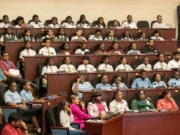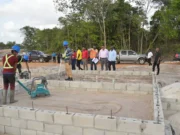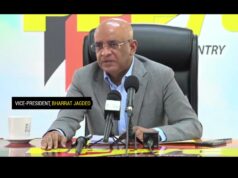Recognizing the importance of a well-trained workforce in driving long-term economic growth, the government of Guyana is making a number of strategic investments in vocational training and technical skill development.
One of the pillars of the government’s strategy in building human capital is the expansion and modernization of educational institutions. According to the mid-year report produced by the Ministry of Finance, the University of Guyana (UG) benefitted from a considerable portion of the country’s oil revenues which were allocated to upgrading its facilities. For the first half of this year, UG spent $1.9 billion of the $4.1 billion set aside for operational improvements. Among these developments is the construction of a new health sciences building at the Turkeyen campus, which is expected to be completed by 2025, offering more advanced training for healthcare professionals.
Free tertiary education by 2025 is a key component of the People’s Progressive Party/Civic (PPP/C) 2020-2025 manifesto. To achieve this goal, President Dr. Mohamed Irfaan Ali has outlined a phased approach, initially targeting those holding loans with the University of Guyana. Additionally, the government plans to write off a substantial $11 billion in loans during this initial stage to assist 13,000 Guyanese.
The Guyana Online Academy of Learning (GOAL), is also a key component of the government’s plan to improve access to higher education across the country. By leveraging technology, the government is ensuring that citizens from all walks of life, including those in remote areas, can pursue tertiary education. This year alone, 8,023 GOAL scholarships were awarded, bringing the total to 29,708, far surpassing the initial target of 20,000 outlined in the government’s manifesto. The programme, according to the mid-year report produced by the Finance Ministry, covers a range of academic pursuits, from bachelor’s and master’s degrees to postgraduate diplomas, ensuring that Guyanese are well-equipped to meet the demands of the modern economy.
Another major focus of the government’s human capital strategy is technical and vocational education, which directly aligns with the needs of Guyana’s growing industries, particularly oil and gas. In the first half of 2024, the Finance Ministry noted that nearly 4,000 Guyanese enrolled in various Technical and Vocational Education and Training (TVET) institutions to pursue certificates in areas such as agro-processing technologies, fiber optic installation, heavy-duty equipment operation, and construction. With $305.7 million expended through the Board of Industrial Training (BIT), over 12,000 people have benefited from training in these critical fields since 2020. This approach ensures that the country’s labour force is not only prepared for traditional industries but also ready to contribute to the technical demands of emerging sectors.
In addition to TVET, the government has also established the Guyana Technical Training College (GTTC) at Port Mourant, Berbice which is focused on oil and gas training. Since its commissioning in February 2024, the GTTC has been instrumental in shaping the next generation of skilled oil and gas professionals. The Facility Simulator (FacTor) Unit, a key feature of the College, has already trained 24 Guyanese in areas such as Instrumentation, Production, Electrical, and Mechanical fields. These graduates, the first from GTTC, are set to complete their practical training aboard the Liza Unity FPSO vessel.
Further demonstrating its commitment to academic upskilling, the government partnered with Coursera to launch the Guyana Coursera platform in March 2024. This initiative provides Guyanese with access to over 6,000 courses from 325 accredited universities worldwide. Over 19,000 people have already enrolled, with commendable interest in the healthcare sector. More than 1,000 participants have registered for the Registered Nurse programme, and 800 have signed up for the Nursing Assistant programme, further addressing the need for skilled healthcare workers in the country.
Recognizing tourism as another rapidly growing industry, the government has also begun constructing Guyana’s first National Hospitality Training Institution in Berbice, Region Six. This institution aims to provide specialized training in tourism and hospitality, positioning Guyanese to capitalize on the country’s burgeoning tourism sector, which is expected to become a key pillar of economic diversification.
Through these strategic investments in education, vocational training, and technical skill development, Guyana is making commendable strides toward building a highly skilled workforce that can manage the country’s resources and lead its economic transformation. The government’s focus on upskilling its people through oil revenue ensures that Guyanese are not only participants in the oil boom but are empowered to take charge of the nation’s future. (Guyana Energy Conference & Supply Chain Expo)













